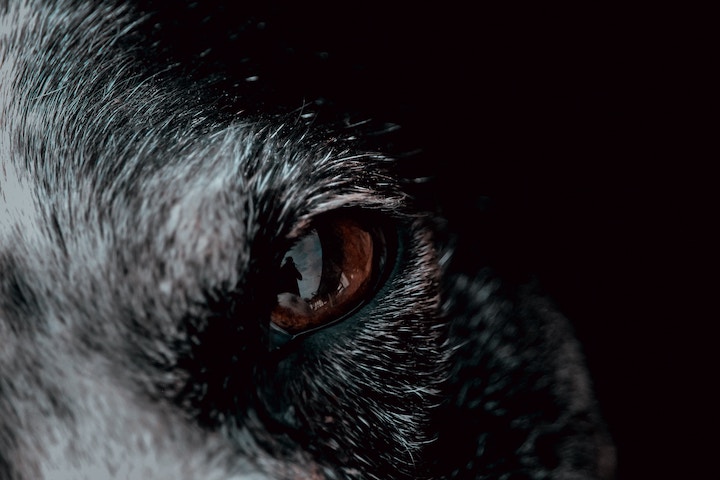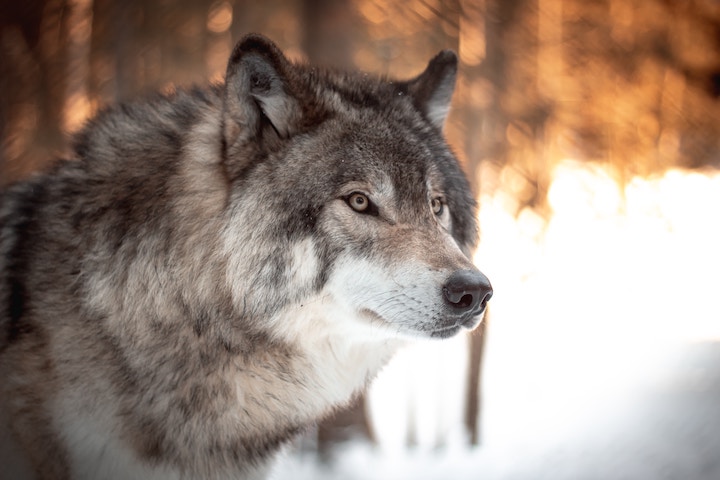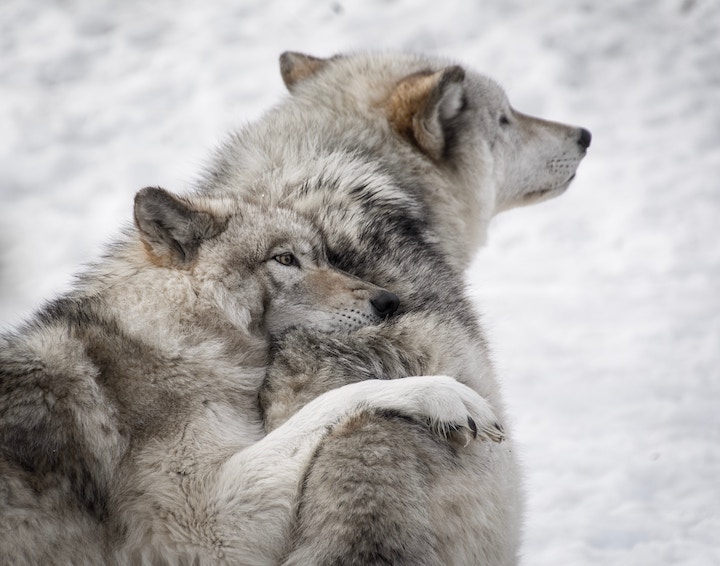Have you ever stumbled upon the lifeless body of a wolf while hiking through the woods? Or perhaps you’ve come across a dead wolf in a dream, its piercing gaze still etched into your memory. The sight of a dead wolf can be haunting, but it also holds a deeper significance.
In this blog post, we will dive into the symbolic meaning behind a dead wolf and explore the various interpretations that have been attached to this powerful creature. From ancient folklore to modern-day symbolism, the dead wolf meaning has captivated the minds of many. So, join me as we unravel the secrets of this enigmatic animal and uncover the hidden messages it holds in its final resting state.
Key Takeaways
- A dead wolf symbolizes the culmination of a journey, transformation, spiritual awakening, release, and resilience.
- Unique symbolisms include silent strength, sacrifice, revelation of hidden truths, solitude, and emotional resolution.
- In dreams, a dead wolf indicates life changes, the end of a significant chapter, or triumph over anxieties.
- As a spirit animal, a dead wolf indicates completed transformations and new beginnings.
- Different cultures interpret the dead wolf symbol differently, while in shamanic practices, it signifies spiritual growth and journey completion.
- In astrology, a dead wolf may suggest emotional transformations or shifts in home life dynamics.
Dead Wolf Meaning
The lifeless form of a wolf holds much symbolic potency, carrying various interpretations that are deeply ingrained in spiritual beliefs and cultural narratives. Let’s delve into some of the spiritual meanings often associated with the sight of a dead wolf:
1. Culmination of a Journey: In the realm of spirituality, a dead wolf often symbolizes the end of a significant life journey. It’s as if the creature’s life represents a chapter of your life that has come to a close, marking the end of an era.
2. Transformation: As creatures that roam both the physical and spiritual realms, wolves are often associated with transformation. In this vein, a dead wolf might symbolize a deep-seated personal transformation. It might reflect the death of old ways or habits, making way for new growth and self-evolution.
3. Spiritual Awakening: If you stumble upon a dead wolf, it could be viewed as a spiritual wake-up call. The image might be signaling that it’s time for you to wake up to your inner truth, unleash your hidden potential, or embark on a spiritual journey.
4. Symbol of Release: A dead wolf can also symbolize a release of sorts. This could be letting go of fears, shedding past burdens, or releasing unhealthy attachments. It’s a symbolic push urging you to lighten your load for the journey ahead.
5. Indication of Resilience: Wolves, as resilient creatures, could signify the discovery of your own resilience in the face of adversity. The sight of a dead wolf could mean that you’ve survived a trying period in your life, and it’s time to rise again, stronger and wiser.
These interpretations highlight the powerful symbolism of a dead wolf, resonating with deep spiritual meanings. It’s a potent reminder of life’s cyclic nature, prompting introspection and growth. Remember, these interpretations are not rigid but rather offer a springboard for your own personal reflections.

Dead Wolf Symbolism
Delving into the symbolism attached to the image of a dead wolf, we uncover myriad intriguing interpretations that go beyond the commonly known associations. Here are five unique and uncommon symbolisms connected to a dead wolf:
1. Symbol of Silent Strength: Wolves are known for their fierce strength and hunting prowess. The death of such a powerful creature could symbolize silent strength. It’s a poignant reminder that strength isn’t always loud and ostentatious; sometimes, it’s quiet, patient, and persevering in the face of adversity.
2. Embodiment of Sacrifice: In certain contexts, a dead wolf might symbolize the ultimate sacrifice. It can represent the surrender of personal desires for the greater good, reminiscent of a wolf’s selfless behavior in protecting its pack.
3. Messenger of Hidden Truths: As creatures linked with mysticism and spirituality, the appearance of a dead wolf could symbolize a revelation of hidden truths. Its demise might indicate that concealed facts or hidden aspects of your life are ready to surface.
4. Harbinger of Solitude: Wolves are known to howl to communicate with their pack, a haunting sound that echoes in the wilderness. A dead wolf, silent and solitary, might symbolize a period of solitude or introspection, inviting you to delve into your inner world.
5. Mirror of Emotional Resolution: Wolves, being emotional creatures, could reflect our own emotional states. A dead wolf might symbolize a resolution of heightened emotional states or the end of an emotionally turbulent phase.
These unique symbolisms of a dead wolf amplify its rich spiritual resonance, deepening our understanding of this enigmatic symbol. It’s fascinating how the lifeless form of a creature known for its vitality and fierceness can evoke such diverse interpretations, reflecting various facets of our human experience.
Also Read – White Wolf Spiritual Meaning, Symbolism and Totem\
Dead Wolf In Dreams
Imagine drifting off to sleep and seeing a dead wolf in your dreamscape. This imagery can carry a multitude of meanings depending on your personal circumstances. Oftentimes, it might signify that you are entering into a fresh phase of existence, or closing a significant chapter of your life. This could be something tangible, such as a job, a relationship, or a place of residence. Alternatively, it could be more internal, representing a shift in your mindset or personal beliefs.
In the grand theater of dreams, if the wolf that appears to you was threatening or instilled fear, its death could represent a triumph over your anxieties or insecurities. This suggests that you are eliminating those elements from your life that no longer benefit you. It’s as if you’re releasing a heavy burden, allowing yourself to move forward unencumbered.
Yet, the meaning of a dead wolf in your dream is not always straightforward. It’s crucial to take into account the overall context of the dream, and your feelings during the experience. Was there a sense of relief, fear, sadness, or joy? These emotions can provide critical clues about the message your subconscious mind is trying to convey.
Additionally, if the dream seems to be recurring or especially vivid, it might be beneficial to engage in dream journaling or seek professional interpretation. Remember, dreams are deeply personal and highly subjective. Thus, your interpretation of a dead wolf in a dream can differ widely from someone else’s.
On the whole, dreaming of a dead wolf is an invitation to introspection and self-awareness. It prompts you to pay attention to the changes in your life, encourages you to let go of the past, and nudges you to step bravely into the future. It’s as if the dead wolf is whispering, “Change is here. Embrace it.”
Wolf As A Spirit Animal
When the wolf emerges as your spirit animal, it serves as a powerful symbol of instinct, intelligence, and appetite for freedom. It becomes your spiritual guide, often associated with transformation and change, illuminating your journey through life’s labyrinth. But what if this guiding wolf meets an untimely end? How should one interpret the symbolism of a dead wolf in the context of a spirit animal?
A dead wolf as a spirit animal is indeed an intriguing phenomenon. It is often interpreted as an indication that a significant shift or transformation in your life has reached completion. It’s as if the wolf spirit has fulfilled its role as a guide and mentor through a particular phase or challenge in your life, and now, its symbolic death signifies the end of that journey.
Yet, a dead wolf as a spirit animal should not be seen merely as an end; it also heralds a new beginning. Just like the nature’s cycle where the end of one thing signifies the start of another, the dead wolf can suggest the dawn of a new journey or a fresh phase in your life. This can be especially meaningful if you’ve recently overcome a significant obstacle or achieved a long-awaited goal.
Interestingly, the dead wolf as a spirit animal also serves as a profound reminder of life’s impermanence. It whispers the wisdom of the transient nature of existence, nudging you to embrace change as an inevitable part of life’s cycle. Just as the wolf spirit once guided you, its symbolic death now pushes you to venture into unknown territories, adapt to evolving circumstances, and grow along with the changing rhythms of life.
However, the interpretation of a dead wolf as a spirit animal can be as unique as your personal journey. It might mirror your individual experiences, challenges, and transformations. Thus, it’s vital to tune into your instincts and emotions when deciphering the message of this powerful symbol.
In essence, a dead wolf as a spirit animal is a paradoxical symbol that embodies both an end and a beginning, symbolizing completed transformations and impending new journeys. It serves as a gentle yet profound reminder that change is an inherent part of existence, urging you to grow, adapt, and evolve with life’s ebb and flow.

Dead Wolf In Various Cultures
Around the world, different cultures and societies have developed their own unique interpretations of what a dead wolf symbolizes. In the rich tapestry of Native American beliefs, wolves are often viewed as symbols of disorder or chaos. Thus, a dead wolf in this context could be seen as signifying the cessation of chaos, a return to harmony or balance. This could apply to an individual’s personal life or to societal dynamics, suggesting a move away from disruption and toward tranquility.
In contrast, many European cultures have a somewhat different view of wolves. Often associated with treachery or deceit, a wolf’s death might symbolize a triumph over dishonesty or betrayal. This could represent an individual overcoming a deceitful situation or a society standing up against corruption and falsehood. It’s fascinating to observe these cultural differences and how they shape the interpretation of such a powerful symbol.
Yet, the symbolism of a dead wolf is not fixed and can evolve with time and societal changes. In today’s globalized world, a dead wolf can take on new meanings, informed by contemporary events and shared experiences. This flexibility adds to the rich complexity of this symbol, allowing it to continue resonating with individuals across diverse cultural landscapes.
Dead Wolf In Shamanic Practices
In the practice of Shamanism, animals hold deep spiritual significance and wolves are no exception. They are often seen as spirit guides, assisting us in navigating life’s complex terrain. So what does the image of a dead wolf signify in shamanic traditions?
Just as the wolf is seen as a guide, its death carries the symbolic meaning of a guidance journey coming to completion. The appearance of a dead wolf might indicate that you have reached a significant milestone on your spiritual journey, suggesting that you have absorbed and integrated the lessons imparted by the wolf spirit guide.
In some shamanic cultures, a dead wolf can be a profound symbol of healing. This can be particularly relevant if you’ve been struggling with personal issues or traumas. The death of the wolf might symbolize the resolution of these struggles, indicating that the healing process has reached its culmination.
A dead wolf in shamanic practices may also signal a shift in your spiritual path. Just as a wolf adapts to the changing seasons, its death can signify that you are ready to adapt to new spiritual landscapes. This could mean exploring new practices, embracing new beliefs, or letting go of spiritual constructs that no longer serve you.
Despite its death, the wolf spirit’s guidance does not vanish. Rather, it morphs into a different form. The essence of the wolf continues to linger, influencing your path in subtler ways. Its death becomes a potent symbol of transformation, reflecting your personal evolution on your spiritual journey. The symbol of a dead wolf, therefore, becomes an invitation to pause, reflect, and honor the journey thus far, while preparing for the next phase of your spiritual exploration.
Check Out – Wolf In Dream Meaning That You Need To Know
Connecting With The Dead Wolf Energy
In astrology, wolves have a unique connection with the water sign, Cancer. Ruled by the moon, much like the wolf itself, Cancerians are deeply intuitive and known for their emotional sensitivity. The image of a dead wolf in this context, thus, carries a multitude of astrological connotations.
When a dead wolf appears in an astrological sense, it might signify substantial transformations in your emotional world. Given the strong emotional connection with Cancer, a dead wolf might represent the end of an emotionally turbulent phase in your life. This could involve resolving long-standing emotional issues, finding closure from past emotional wounds, or letting go of outdated emotional patterns that no longer serve your growth.
Likewise, since Cancer governs the realm of home and family, the image of a dead wolf could signal significant shifts in these aspects of your life. Perhaps you’re transitioning to a new living environment, or there are shifts in your familial dynamics. The dead wolf here signifies an end to the old and a welcoming of new changes at home.
However, despite the physical absence, the spirit of the wolf continues to shine in the night sky. Just like the moon’s phases, the wolf in astrology teaches us that endings are merely precursors to beginnings. Therefore, even in its death, the wolf urges us to face change courageously, remain resilient amid transitions, and navigate life’s tides with grace and wisdom.
Remember, the interpretation of a dead wolf in astrology is personal and unique to each individual. As such, it’s important to consider your own personal astrology and life circumstances when unraveling the meaning of this potent symbol. In the end, whether in life or in death, the wolf continues to guide us, lighting the path with its lunar wisdom.

Conclusion
As we wind our exploration of the symbolic meaning of a dead wolf, it’s clear that this powerful symbol goes beyond the haunting image of a lifeless creature. It carries a profound resonance, embodying both ends and beginnings, symbolizing personal transformation and spiritual growth, and signaling societal transitions. Its representation spans the realms of dreams, spirituality, cultural beliefs, Shamanic practices, and astrology, each adding a unique dimension to its interpretation.
Whether it’s the silent strength of a resilient creature, the surrender of a selfless protector, the disclosure of hidden truths, the solitude of a reflective phase, or the resolution of emotional turmoil, each interpretation of a dead wolf unveils a different layer of our human experience. And that’s the beauty of symbolic interpretations – they mirror our inner world, our trials, our triumphs, our journey.
Engaging with the energy of a dead wolf, whether in dreams or waking life, serves as an invitation for introspection, growth, and healing. It encourages us to adapt to life’s changing rhythms, rise above adversities, and evolve alongside our transforming selves.
As we tread our life’s path, the image of a dead wolf teaches us to face changes with courage and resilience, to let go of what no longer serves us, and to welcome new beginnings with open arms. It is a testament to life’s cyclic nature – a gentle reminder that every ending paves the way for a fresh start. And amidst this ebb and flow, the spirit of the wolf continues to guide us, its lunar wisdom illuminating our path, even in death.
In essence, the symbolism of a dead wolf is a paradox, representing both an end and a new beginning. It is a beautiful contradiction that beautifully encapsulates the complexity of life itself. As we continue to decode the language of symbols, let the dead wolf be a reminder of our capacity for transformation, resilience, and growth. Let it inspire us to honor our journey, no matter how winding the path.
Frequently Asked Questions
- What does a dead wolf symbolize in dreams?
A dead wolf in dreams often indicates significant life changes, the end of a crucial chapter, or victory over fears and anxieties. The meaning varies depending on your personal circumstances and feelings during the dream.
- How is a dead wolf seen as a spirit animal?
A dead wolf as a spirit animal signifies completed transformations and the beginning of new life phases. It’s a profound reminder of life’s impermanence and the constant flow of change.
- What unique symbolisms are associated with a dead wolf?
Uncommon symbolisms include silent strength, sacrifice, revelation of hidden truths, solitude, and emotional resolution. These interpretations enhance the rich spiritual resonance of this symbol.
- How do different cultures interpret the symbol of a dead wolf?
Interpretations vary across cultures. For instance, in Native American beliefs, a dead wolf could symbolize the end of chaos, while in many European cultures, it could represent triumph over deceit.
- What does a dead wolf signify in astrology?
In astrology, particularly with the Cancer sign, a dead wolf might suggest substantial emotional transformations or shifts in home and family dynamics. It’s about embracing change and navigating life’s tides with grace and wisdom.

